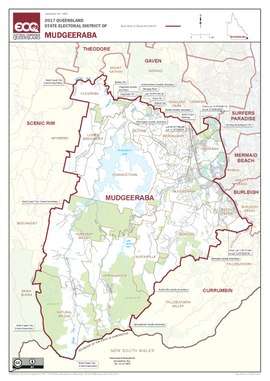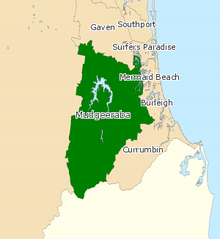Electoral district of Mudgeeraba
Mudgeeraba is an electoral district of the Legislative Assembly in the Australian state of Queensland. Based on the Gold Coast, the district has been held by both sides of politics over the course of its short history.[1]
| Mudgeeraba Queensland—Legislative Assembly | |||||||||||||||
|---|---|---|---|---|---|---|---|---|---|---|---|---|---|---|---|
 Electoral map of Mudgeeraba 2017 | |||||||||||||||
| State | Queensland | ||||||||||||||
| Dates current | 2001–present | ||||||||||||||
| MP | Ros Bates | ||||||||||||||
| Party | Liberal National | ||||||||||||||
| Namesake | Mudgeeraba | ||||||||||||||
| Electors | 35,448 (2017) | ||||||||||||||
| Area | 368 km2 (142.1 sq mi) | ||||||||||||||
| Coordinates | 28°7′S 153°18′E | ||||||||||||||
| |||||||||||||||

Electoral map of Mudgeeraba 2008
The electorate covers the western suburbs and hinterland of the Gold Coast. It was created out of the southern half of the former district of Nerang by the 2001 redistribution.
Dianne Reilly of the Labor Party, the seat's inaugural member, held the seat for three terms until her defeat at the hands of Ros Bates of the Liberal National Party at the 2009 state election.
Members for Mudgeeraba
| Member | Party | Term | |
|---|---|---|---|
| Dianne Reilly | Labor | 2001–2009 | |
| Ros Bates | Liberal National | 2009–present | |
Election results
| Party | Candidate | Votes | % | ± | |
|---|---|---|---|---|---|
| Liberal National | Ros Bates | 13,695 | 46.1 | −3.9 | |
| Labor | Paul Taylor | 6,977 | 23.5 | −4.5 | |
| One Nation | Andrew Liddell | 5,288 | 17.8 | +17.8 | |
| Greens | Rod Duncan | 2,763 | 9.3 | +1.4 | |
| Independent | Bill Sherwood | 625 | 2.1 | +0.3 | |
| Independent | Jill Pead | 385 | 1.3 | +1.3 | |
| Total formal votes | 29,733 | 94.9 | −2.4 | ||
| Informal votes | 1,605 | 5.1 | +2.4 | ||
| Turnout | 31,338 | 86.4 | +2.3 | ||
| Two-party-preferred result | |||||
| Liberal National | Ros Bates | 17,795 | 59.8 | −0.6 | |
| Labor | Paul Taylor | 11,938 | 40.2 | +0.6 | |
| Liberal National hold | Swing | −0.6 | |||
gollark: As well as having special casing for stuff, it often is just pointlessly hostile to abstracting anything:- lol no generics- you literally cannot define a well-typed `min`/`max` function (like Lua has). Unless you do something weird like... implement an interface for that on all the builtin number types, and I don't know if it would let you do that.- no map/filter/reduce stuff- `if err != nil { return err }`- the recommended way to map over an array in parallel, if I remember right, is to run a goroutine for every element which does whatever task you want then adds the result to a shared "output" array, and use a WaitGroup thingy to wait for all the goroutines. This is a lot of boilerplate.
gollark: It also does have the whole "anything which implements the right functions implements an interface" thing, which seems very horrible to me as a random change somewhere could cause compile errors with no good explanation.
gollark: - `make`/`new` are basically magic- `range` is magic too - what it does depends on the number of return values you use, or something. Also, IIRC user-defined types can't implement it- Generics are available for all of, what, three builtin types? Maps, slices and channels, if I remember right.- `select` also only works with the built-in channels- Constants: they can only be something like four types, and what even is `iota` doing- The multiple return values can't be used as tuples or anything. You can, as far as I'm aware, only return two (or, well, more than one) things at once, or bind two returns to two variables, nothing else.- no operator overloading- it *kind of* has exceptions (panic/recover), presumably because they realized not having any would be very annoying, but they're not very usable- whether reading from a channel is blocking also depends how many return values you use because of course
gollark: What, you mean no it doesn't have weird special cases everywhere?
gollark: It pretends to be "simple", but it isn't because there are bizarre special cases everywhere to make stuff appear to work.
References
- "Representatives of Queensland State Electorates 1860-2017" (PDF). Queensland Parliamentary Record 2012-2017: The 55th Parliament. Queensland Parliament. Archived from the original on 27 April 2020.CS1 maint: unfit url (link)
- 2017 State General Election - Mudgeeraba - District Summary, ECQ.
External links
This article is issued from Wikipedia. The text is licensed under Creative Commons - Attribution - Sharealike. Additional terms may apply for the media files.